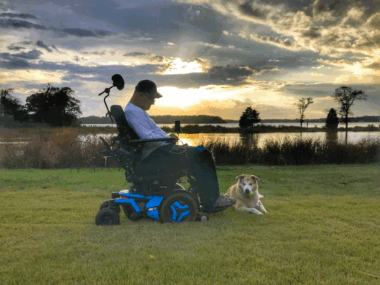A constant shadow of fear hung over my caregiver responsibilities
Caring for my late husband was often stressful and arduous
Written by |

I remember the first caregiving task that I completed for my late husband, Jeff, after he was diagnosed with ALS in the fall of 2018. His symptoms had started with a foot drop, and by the time of his diagnosis, his right foot had become paralyzed. It became my job each morning to put on his socks and shoes.
It was a task I enjoyed because it was simple and intimate. Jeff would sit on the side of the bed, having fully dressed himself, and I’d complete the process by pulling on each sock and then placing each shoe and tying his laces. I once put his shoes on the wrong feet and he snapped at me, “Focus!” We both laughed ruefully at the sad and ridiculous situation.
I came to think of my second-favorite task as Pill Night. Jeff’s ALS diagnosis came with an arsenal of drugs to help mitigate various symptoms. ALS has no curative treatments, beyond a few drugs that may extend survival by a few months, so the medications Jeff took were simply to help manage symptoms and alleviate pain.
Pill Night was every Friday. I’d assemble all of the medication bottles on the coffee table while Jeff kept me company and watched TV, initially from the couch, then in his scooter, and ultimately in his power wheelchair. I’d meticulously count out the pills he’d need for the week and organize them by day, then time of day. There were too many to fit in a traditional pill organizer, so I ordered small condiment cups with lids where I’d place and label each supply.
I found these caregiving tasks satisfying because I felt competent doing them, and they made me feel closer to Jeff. There was minimal risk of me making a mistake and inadvertently hurting him, and these tasks were not physical or arduous or scary — as the rest of ALS caregiving became.
The most stressful caregiving task for both me and Jeff was using the Hoyer lift. By the time Jeff began using a power wheelchair in the fall of 2019, he couldn’t maneuver himself into it. It became part of my caregiving routine to get Jeff out of bed for the day and back into it at night using this lift, which consisted of a sling placed around his body and two electric arms that raised and lowered it to place Jeff into the chair or back into bed.
Positioning the sling around Jeff’s body in a way that didn’t hurt him or leave him feeling more vulnerable was challenging. It often took many tries and precise adjustments before we could lift him. Once he was lifted, he found the process of transferring to the power chair terrifying, as he was suspended over the floor until we got him to the safety of the chair.
Lowering him into the chair was another vulnerable moment, because if I didn’t place him correctly, his body would slide forward, leaving both of us concerned about a fall. Because he was still over 200 pounds even later in his disease, I couldn’t move him or make adjustments without using the lift.

Jeff Sarnacki and his dog, Rudder, relax on a fall afternoon in Maryland. (Photo by Juliet Taylor)
The entire transfer process could take an hour or more, both in the morning and at bedtime. It was a difficult way to start and end the day for each of us — a far cry from the peaceful mornings we’d once enjoyed lying in bed drinking coffee, or the quiet evenings watching TV or talking contentedly, planning our next house project or activities for the coming weekend. Caregiving in ALS is often accompanied by unspoken sadness and loss.
Caregiving took a toll on both of us, even though Jeff was the patient and I was the one providing care. It thrust us unwillingly into roles beyond husband and wife, into roles we hadn’t asked for.
As someone who’d always taken care of others — indeed, as a federal law enforcement agent, Jeff had built a 30-year career of it — he found it hard to be the one needing help. And caregiving brought out my own self-doubts and insecurities about whether I was doing it right and whether I was doing enough. It often caused us to snap at each other through a veil of exhaustion and fear.
What I’ve since learned from others in the ALS community is that caregiving is challenging even for those trained in medical care, much less laypeople, which most of us are. Even done with love and compassion, it’s physical, scary, and unrelenting.
More than five years after Jeff’s death, I look back on the simplicity of Pill Night with fondness. But I still remember the intensity, fear, and sadness that accompanied so much else.
Note: ALS News Today is strictly a news and information website about the disease. It does not provide medical advice, diagnosis, or treatment. This content is not intended to be a substitute for professional medical advice, diagnosis, or treatment. Always seek the advice of your physician or other qualified health provider with any questions you may have regarding a medical condition. Never disregard professional medical advice or delay in seeking it because of something you have read on this website. The opinions expressed in this column are not those of ALS News Today or its parent company, Bionews, and are intended to spark discussion about issues pertaining to ALS.






Sherry Jeanne Campbell
You were a trooper and the best kind of wife for someone with ALS. Being the caregiver for someone who always was taking care of you is an unfamiliar and often uncomfortable for the caregiver and the patient. With a husband who had always been our electrician, plumber, carpenter, pool maintainer, and lawn care expert, I faced a steep learning curve.
I took baby steps with my husband, who often refused to ask for help until he had 100% convinced himself that he could no longer put on his own shoes, underwear, shorts, and shirt. Relinquishing control of the automobile steering wheel was another long process, only completed when he realized that trying to drive a "regular" car with two uncontrollable feet was dangerous. The real challenge for me was the year in which he got his g-tube, indwelling catheter, a trach, and an ostomy bag, all within a 6-month period. Since then, he's been bedridden and I've mastered all the tasks needed to care for him. I'm doing things I could never have imagined, but in doing so I've seen God's plan for me and developed a more loving heart, more patience, and more tenacity than I'd ever imagined possible.
Janet Favorite
Dear Juliet what a difficult time you had. Hard to lose a beloved spouse this way. You discribed your feelings so well.
Alicia Lowther
Beautiful article. Sincere condolences for the loss of your husband. My husband has Inclusion Body Myositis which is very similar to ALS.
Tammy Flowers
This story resonated with me. My brother was diagnosed in 2024 and passed away August of 2025. My mom and sisters became his caregivers. Learning to use the hoyer lift was one of the scariest parts of caring for him.
Betty Cramer
You absolutely nailed it.
Looking back I'm so honored that I was given this task. ALS is a burden in all of us, but 15 years later I would gladly welcome the challenge again.
My hero was just 47 when ALS chose him.